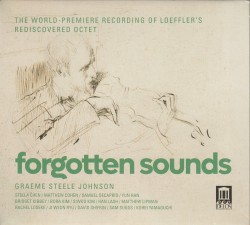 Forgotten Sounds
Forgotten Sounds
Graeme Steele Johnson; various artists
Delos DE3603 (naxos.com/CatalogueDetail/?id=DE3603)
Whether ‘tis nobler to let sleeping dogs lie, some folks will play archaeologist and unearth the bones of former titans, or giants, or mere mortals perhaps. Such is the admirable effort displayed on this disc by clarinetist Graeme Steele Johnson, assisted by some very fine chamber players. Forgotten Sounds is the title of both the album and the last track, an arrangement of Charles Loeffler’s pretty little bit of fluff originally for voice and piano, here played by Johnson with Bridget Kibbey on harp.
The centrepiece of this disc is Loeffler’s Octet (clarinets, strings and harp) discovered and recomposed by Johnson. It includes two clarinet parts just as Brahms’ original sketches for a nonet* did. Coincidence, you ask? Hmmm.
Loeffler is referred to as a “cosmopolitan” composer, a European living in the U.S, acclaimed in his lifetime, ignored since. His style places him in the conservative end of the spectrum of post-Brahmsians, tonally less inventive than either Schoenberg or Zemlinksy, with quirky structural and timbral tropes both puzzling but pleasant. There’s no way of knowing how much the piece reflects decisions only the arranger could make, but verbatim it seems, like Saint-Saëns, Loeffler “lacked only inexperience.” Some of his compositional gambits make me wonder whether he wasn’t a bit cynical, providing what was expected of a European artist. Unoriginal post-colonial kitsch, if you will.
A reduction for similar forces (minus clarinet two) opens the proceedings with a version of Prelude à l’après-midi d’un faune. Steele’s arrangement gives pride of place to the flute voice, played with enchanting lyricism by Ji Weon Ryu. Loeffler’s dabs of whole-tone scale colour indicates he respected the Frenchman’s music enough to borrow some of it for his own piece.
*(An aside: Brahms’ didn’t publish his nonet; it was rescued by his editor, with Brahms’ consent. Brahms showed the original chamber piece to Clara Schumann, who prompted him to rework it for orchestra. Eager to please, he abandoned his notion of answering the Beethoven Septet, and Schubert Octet. Using the same content he wrote his first orchestral serenade. Thank goodness for that editor, it’s a truly lovely chamber work.)



